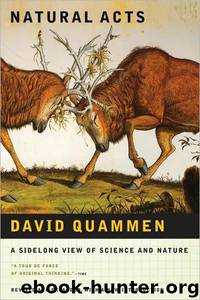Natural Acts: A Sidelong View of Science and Nature by David Quammen

Author:David Quammen
Language: eng
Format: mobi
Tags: Science
ISBN: 9780393333602
Publisher: W. W. Norton & Company
Published: 2009-02-24T00:00:00+00:00
Now we come to the question of human survival, a matter of some interest to many. We come to a certain fretful leap of logic that otherwise thoughtful observers seem willing, even eager, to make: that the ultimate consequence will be the extinction of us. By seizing such a huge share of Earth’s landscape, by imposing so wantonly on its providence and presuming so recklessly on its forgiveness, by killing off so many species, they say, we will doom our own species to extinction. This is a commonplace argument among the environmentally exercised. In earlier years, from a somewhat less informed perspective, I made the same argument myself. Since then, my thinking has changed. My objection to the idea now is that it seems ecologically improbable and too optimistic. But it bears examining, because it’s frequently offered as the ultimate argument against proceeding as we are.
Jablonski also has his doubts. Do you see Homo sapiens as a likely survivor, I ask him, or as a casualty? “Oh, we’ve got to be one of the most bomb-proof species on the planet,” he says. “We’re geographically widespread, we have a pretty remarkable reproductive rate, we’re incredibly good at co-opting and monopolizing resources. I think it would take a really serious, concerted effort to wipe out the human species.” The point he’s making is one that has probably already dawned on you: Homo sapiens itself is the consummate weed. Why shouldn’t we survive, then, on the Planet of Weeds? But there’s a wide range of possible circumstances, Jablonski reminds me, between the extinction of our species and the continued growth of human population, consumption, and comfort. “I think we’ll be one of the survivors,” he says, “sort of picking through the rubble.” Besides the loss of all the pharmaceutical and genetic resources that lay hidden within those extinguished species, and all the spiritual and aesthetic values they offered, he foresees unpredictable levels of loss in many physical and biochemical functions that ordinarily come as benefits from diverse, robust ecosystems—functions such as cleaning and recirculating air and water, mitigating droughts and floods, decomposing wastes, controlling erosion, creating new soil, pollinating crops, capturing and transporting nutrients, damping short-term temperature extremes and longer-term fluctuations of climate, restraining outbreaks of pestiferous species, and shielding Earth’s surface from the full brunt of ultraviolet radiation. Strip away the ecosystems that perform those services, Jablonski says, and you can expect grievous detriment to the reality we inhabit. “A lot of things are going to happen that will make this a crummier place to live—a more stressful place to live, a more difficult place to live, a less resilient place to live—before the human species is at any risk at all.” And maybe some of the new difficulties, he adds, will serve as incentive for major changes in the trajectory along which we pursue our aggregate self-interests. Maybe we’ll pull back before our current episode matches the Triassic extinction or the K-T event. Maybe it will turn out to be no worse than the Eocene extinction, with a 35 percent loss of species.
Download
This site does not store any files on its server. We only index and link to content provided by other sites. Please contact the content providers to delete copyright contents if any and email us, we'll remove relevant links or contents immediately.
| Anatomy | Animals |
| Bacteriology | Biochemistry |
| Bioelectricity | Bioinformatics |
| Biology | Biophysics |
| Biotechnology | Botany |
| Ecology | Genetics |
| Paleontology | Plants |
| Taxonomic Classification | Zoology |
Sapiens: A Brief History of Humankind by Yuval Noah Harari(14368)
The Tidewater Tales by John Barth(12652)
Mastermind: How to Think Like Sherlock Holmes by Maria Konnikova(7323)
Do No Harm Stories of Life, Death and Brain Surgery by Henry Marsh(6938)
The Thirst by Nesbo Jo(6932)
Why We Sleep: Unlocking the Power of Sleep and Dreams by Matthew Walker(6706)
Life 3.0: Being Human in the Age of Artificial Intelligence by Tegmark Max(5548)
Sapiens by Yuval Noah Harari(5366)
The Body: A Guide for Occupants by Bill Bryson(5082)
The Longevity Diet by Valter Longo(5058)
The Rules Do Not Apply by Ariel Levy(4957)
The Immortal Life of Henrietta Lacks by Rebecca Skloot(4578)
Animal Frequency by Melissa Alvarez(4462)
Why We Sleep by Matthew Walker(4434)
The Hacking of the American Mind by Robert H. Lustig(4375)
Yoga Anatomy by Kaminoff Leslie(4358)
All Creatures Great and Small by James Herriot(4311)
Double Down (Diary of a Wimpy Kid Book 11) by Jeff Kinney(4261)
Embedded Programming with Modern C++ Cookbook by Igor Viarheichyk(4173)
